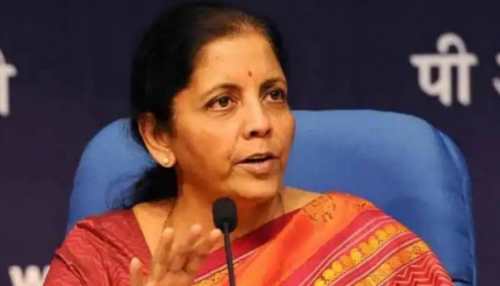- News>
- Business
Centre did not raise taxes to fund economic recovery, says FM Sitharaman

Finance Minister Nirmala Sitharaman said that unlike several developed nations, the Modi government did not raise taxes to fund the recovery of the COVID-hit economy and focussed on raising public expenditure on infrastructure as it has a multiplier effect.
Highlights
- Sitharaman also took a dig at the Congress.
- She recalled that the then Prime Minister Indira Gandhi had prescribed marginal rate of taxation to 93.5 per cent.
New Delhi: Finance Minister Nirmala Sitharaman on Friday said that unlike several developed nations, the Modi government did not raise taxes to fund the recovery of the COVID-hit economy and focussed on raising public expenditure on infrastructure as it has a multiplier effect.
While replying to a discussion on the Finance Bill in the Lok Sabha, Sitharaman also took a dig at the Congress by recalling that the then Prime Minister Indira Gandhi had prescribed marginal rate of taxation to 93.5 per cent on income above Rs 2 lakh and India's first Prime Minister Jawaharlal Nehru for attributing price rise in 1951 to the Korean war, though India was not very much globally inter-connected.
The Lok Sabha, later, approved the Finance Bill 2022 giving effect to the taxation proposals and completing the Budgetary exercise for 2022-23 fiscal by the lower house.
Sitharaman said the Modi Government's belief in lowering taxes and reduction in corporate tax have started yielding results with corporate tax collection touching Rs 7.3 lakh crore so far this fiscal as against Rs 6.6 lakh crore in the previous financial year.
The reduction in corporate tax has "helped the economy, government and companies, and we are seeing the progress", she said.
"People who make and run businesses are treated with a sense of pride so that they can create jobs. We don't treat them as people from whom we have to suck out everything," she said.
Referring to the increase in fuel prices, Sitharaman said it was on account of the ongoing war between Russia and Ukraine. The impact is being felt by all countries as global supply chains have been affected.
She said, "Even in 1951, Pt. Jawaharlal Nehru could say that a Korean war can affect Indian inflation... But if today, in a globally connected world, we say that Ukraine (war) is affecting us, it is not accepted".
She further said that tax is a matter in which the Congress party never thought of reducing the common man's burden whereas we're constantly working to make sure that people are not burdened.
India is probably the only major economy that did not resort to new taxes to fund the recovery of the economy hit by the Covid pandemic, she said, adding that as many as 32 countries, including Germany, France, Canada and UK, have increased the tax rates after the pandemic.
"Instead, we put more money where multiplier effect would be maximum," she said while referring to the Budget's focus on raising capital expenditure.
The Budget 2022-23 raised Capex by 35.4 per cent to Rs 7.5 lakh crore to continue the public investment-led recovery of the pandemic battered economy.
The number of taxpayers has increased to 9.1 crores from 5 crores a few years back, she said, adding the government is taking steps to widen the tax base and the faceless assessment has been received well by people.
Responding to the concerns expressed by members on imposing customs duty on umbrellas, she said it was done to encourage domestic manufacturing by MSMEs. She further said that IFSC in Gujarat is making steady progress, and several global funds and insurance companies are setting up offices in the International Financial Services Centre at Gujarat International Finance Tec-City (GIFT).
On the charge of misusing the Enforcement Directorate, she said the ED comes into the picture later after the offences have been investigated by other agencies.
Responding to the concerns raised by members on GST, she said imprisonment is only in cases of serious nature and not for minor mistakes or wrong entries. Also Read: Airtel to acquire Vodafone's 4.7% stake in Indus Towers for Rs 2,388 crore
"GST law also doesn't provide for imprisonment in cases where the amount of tax evaded or ITC availed and utilised is less than the threshold limit of Rs 1 crore," she said. Also Read: When will 5G spectrum auction begin? Centre shares major update
#mute
